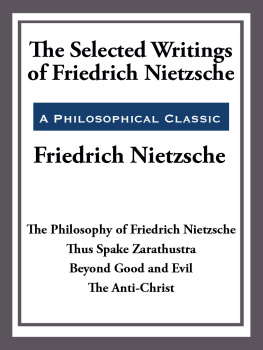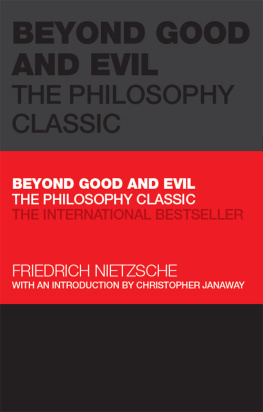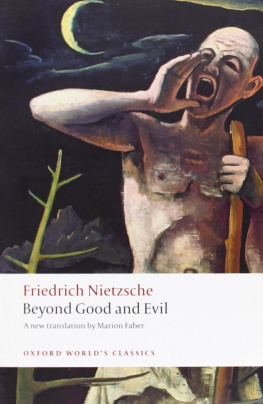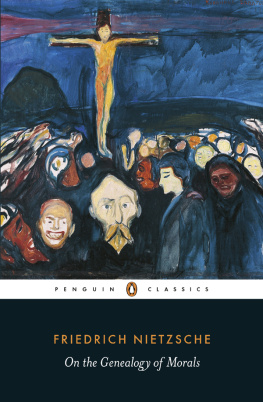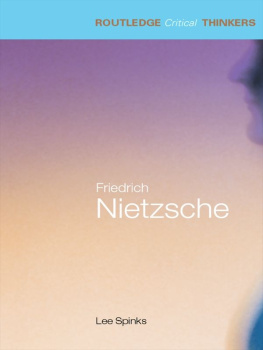Nietzsche Friedrich - Beyond Good and Evil
Here you can read online Nietzsche Friedrich - Beyond Good and Evil full text of the book (entire story) in english for free. Download pdf and epub, get meaning, cover and reviews about this ebook. genre: Science. Description of the work, (preface) as well as reviews are available. Best literature library LitArk.com created for fans of good reading and offers a wide selection of genres:
Romance novel
Science fiction
Adventure
Detective
Science
History
Home and family
Prose
Art
Politics
Computer
Non-fiction
Religion
Business
Children
Humor
Choose a favorite category and find really read worthwhile books. Enjoy immersion in the world of imagination, feel the emotions of the characters or learn something new for yourself, make an fascinating discovery.
- Book:Beyond Good and Evil
- Author:
- Genre:
- Rating:3 / 5
- Favourites:Add to favourites
- Your mark:
- 60
- 1
- 2
- 3
- 4
- 5
Beyond Good and Evil: summary, description and annotation
We offer to read an annotation, description, summary or preface (depends on what the author of the book "Beyond Good and Evil" wrote himself). If you haven't found the necessary information about the book — write in the comments, we will try to find it.
Beyond Good and Evil — read online for free the complete book (whole text) full work
Below is the text of the book, divided by pages. System saving the place of the last page read, allows you to conveniently read the book "Beyond Good and Evil" online for free, without having to search again every time where you left off. Put a bookmark, and you can go to the page where you finished reading at any time.
Font size:
Interval:
Bookmark:
The Project Gutenberg EBook of Beyond Good and Evil, by Friedrich Nietzsche
This eBook is for the use of anyone anywhere at no cost and with
almost no restrictions whatsoever. You may copy it, give it away or
re-use it under the terms of the Project Gutenberg License included
with this eBook or online at www.gutenberg.org
Title: Beyond Good and Evil
Author: Friedrich Nietzsche
Translator: Helen Zimmern
Release Date: December 7, 2009 [EBook #4363]
Language: English
*** START OF THIS PROJECT GUTENBERG EBOOK BEYOND GOOD AND EVIL ***
Produced by John Mamoun, Charles Franks, David Widger and the Online
Distributed Proofreading Team
The following is a reprint of the Helen Zimmern translation from German into English of "Beyond Good and Evil," as published in The Complete Works of Friedrich Nietzsche (1909-1913). Some adaptations from the original text were made to format it into an e-text. Italics in the original book are capitalized in this e-text, except for most foreign language phrases that were italicized. Original footnotes are put in brackets [ ] at the points where they are cited in the text. Some spellings were altered. "To-day" and "To-morrow" are spelled "today" and "tomorrow." Some words containing the letters "ise" in the original text, such as "idealise," had these letters changed to "ize," such as "idealize." "Sceptic" was changed to "skeptic."
| CHAPTER I. | PREJUDICES OF PHILOSOPHERS |
| CHAPTER II. | THE FREE SPIRIT |
| CHAPTER III. | THE RELIGIOUS MOOD |
| CHAPTER IV. | APOPHTHEGMS AND INTERLUDES |
| CHAPTER V. | THE NATURAL HISTORY OF MORALS |
| CHAPTER VI. | WE SCHOLARS |
| CHAPTER VII. | OUR VIRTUES |
| CHAPTER VIII. | PEOPLES AND COUNTRIES |
| CHAPTER IX. | WHAT IS NOBLE? |
SUPPOSING that Truth is a womanwhat then? Is there not ground for suspecting that all philosophers, in so far as they have been dogmatists, have failed to understand womenthat the terrible seriousness and clumsy importunity with which they have usually paid their addresses to Truth, have been unskilled and unseemly methods for winning a woman? Certainly she has never allowed herself to be won; and at present every kind of dogma stands with sad and discouraged mienIF, indeed, it stands at all! For there are scoffers who maintain that it has fallen, that all dogma lies on the groundnay more, that it is at its last gasp. But to speak seriously, there are good grounds for hoping that all dogmatizing in philosophy, whatever solemn, whatever conclusive and decided airs it has assumed, may have been only a noble puerilism and tyronism; and probably the time is at hand when it will be once and again understood WHAT has actually sufficed for the basis of such imposing and absolute philosophical edifices as the dogmatists have hitherto reared: perhaps some popular superstition of immemorial time (such as the soul-superstition, which, in the form of subject- and ego-superstition, has not yet ceased doing mischief): perhaps some play upon words, a deception on the part of grammar, or an audacious generalization of very restricted, very personal, very humanall-too-human facts. The philosophy of the dogmatists, it is to be hoped, was only a promise for thousands of years afterwards, as was astrology in still earlier times, in the service of which probably more labour, gold, acuteness, and patience have been spent than on any actual science hitherto: we owe to it, and to its "super-terrestrial" pretensions in Asia and Egypt, the grand style of architecture. It seems that in order to inscribe themselves upon the heart of humanity with everlasting claims, all great things have first to wander about the earth as enormous and awe-inspiring caricatures: dogmatic philosophy has been a caricature of this kindfor instance, the Vedanta doctrine in Asia, and Platonism in Europe. Let us not be ungrateful to it, although it must certainly be confessed that the worst, the most tiresome, and the most dangerous of errors hitherto has been a dogmatist errornamely, Plato's invention of Pure Spirit and the Good in Itself. But now when it has been surmounted, when Europe, rid of this nightmare, can again draw breath freely and at least enjoy a healthiersleep, we, WHOSE DUTY IS WAKEFULNESS ITSELF, are the heirs of all the strength which the struggle against this error has fostered. It amounted to the very inversion of truth, and the denial of the PERSPECTIVEthe fundamental conditionof life, to speak of Spirit and the Good as Plato spoke of them; indeed one might ask, as a physician: "How did such a malady attack that finest product of antiquity, Plato? Had the wicked Socrates really corrupted him? Was Socrates after all a corrupter of youths, and deserved his hemlock?" But the struggle against Plato, orto speak plainer, and for the "people"the struggle against the ecclesiastical oppression of millenniums of Christianity (FOR CHRISTIANITY IS PLATONISM FOR THE "PEOPLE"), produced in Europe a magnificent tension of soul, such as had not existed anywhere previously; with such a tensely strained bow one can now aim at the furthest goals. As a matter of fact, the European feels this tension as a state of distress, and twice attempts have been made in grand style to unbend the bow: once by means of Jesuitism, and the second time by means of democratic enlightenmentwhich, with the aid of liberty of the press and newspaper-reading, might, in fact, bring it about that the spirit would not so easily find itself in "distress"! (The Germans invented gunpowderall credit to them! but they again made things squarethey invented printing.) But we, who are neither Jesuits, nor democrats, nor even sufficiently Germans, we GOOD EUROPEANS, and free, VERY free spiritswe have it still, all the distress of spirit and all the tension of its bow! And perhaps also the arrow, the duty, and, who knows? THE GOAL TO AIM AT....
Sils Maria Upper Engadine, JUNE, 1885.
1. The Will to Truth, which is to tempt us to many a hazardous enterprise, the famous Truthfulness of which all philosophers have hitherto spoken with respect, what questions has this Will to Truth not laid before us! What strange, perplexing, questionable questions! It is already a long story; yet it seems as if it were hardly commenced. Is it any wonder if we at last grow distrustful, lose patience, and turn impatiently away? That this Sphinx teaches us at last to ask questions ourselves? WHO is it really that puts questions to us here? WHAT really is this "Will to Truth" in us? In fact we made a long halt at the question as to the origin of this Willuntil at last we came to an absolute standstill before a yet more fundamental question. We inquired about the VALUE of this Will. Granted that we want the truth: WHY NOT RATHER untruth? And uncertainty? Even ignorance? The problem of the value of truth presented itself before usor was it we who presented ourselves before the problem? Which of us is the Oedipus here? Which the Sphinx? It would seem to be a rendezvous of questions and notes of interrogation. And could it be believed that it at last seems to us as if the problem had never been propounded before, as if we were the first to discern it, get a sight of it, and RISK RAISING it? For there is risk in raising it, perhaps there is no greater risk.
2. "HOW COULD anything originate out of its opposite? For example, truth out of error? or the Will to Truth out of the will to deception? or the generous deed out of selfishness? or the pure sun-bright vision of the wise man out of covetousness? Such genesis is impossible; whoever dreams of it is a fool, nay, worse than a fool; things of the highest value must have a different origin, an origin of THEIR ownin this transitory, seductive, illusory, paltry world, in this turmoil of delusion and cupidity, they cannot have their source. But rather in the lap of Being, in the intransitory, in the concealed God, in the 'Thing-in-itselfTHERE must be their source, and nowhere else!"This mode of reasoning discloses the typical prejudice by which metaphysicians of all times can be recognized, this mode of valuation is at the back of all their logical procedure; through this "belief" of theirs, they exert themselves for their "knowledge," for something that is in the end solemnly christened "the Truth." The fundamental belief of metaphysicians is THE BELIEF IN ANTITHESES OF VALUES. It never occurred even to the wariest of them to doubt here on the very threshold (where doubt, however, was most necessary); though they had made a solemn vow, "DE OMNIBUS DUBITANDUM." For it may be doubted, firstly, whether antitheses exist at all; and secondly, whether the popular valuations and antitheses of value upon which metaphysicians have set their seal, are not perhaps merely superficial estimates, merely provisional perspectives, besides being probably made from some corner, perhaps from below"frog perspectives," as it were, to borrow an expression current among painters. In spite of all the value which may belong to the true, the positive, and the unselfish, it might be possible that a higher and more fundamental value for life generally should be assigned to pretence, to the will to delusion, to selfishness, and cupidity. It might even be possible that WHAT constitutes the value of those good and respected things, consists precisely in their being insidiously related, knotted, and crocheted to these evil and apparently opposed thingsperhaps even in being essentially identical with them. Perhaps! But who wishes to concern himself with such dangerous "Perhapses"! For that investigation one must await the advent of a new order of philosophers, such as will have other tastes and inclinations, the reverse of those hitherto prevalentphilosophers of the dangerous "Perhaps" in every sense of the term. And to speak in all seriousness, I see such new philosophers beginning to appear.
Font size:
Interval:
Bookmark:
Similar books «Beyond Good and Evil»
Look at similar books to Beyond Good and Evil. We have selected literature similar in name and meaning in the hope of providing readers with more options to find new, interesting, not yet read works.
Discussion, reviews of the book Beyond Good and Evil and just readers' own opinions. Leave your comments, write what you think about the work, its meaning or the main characters. Specify what exactly you liked and what you didn't like, and why you think so.







